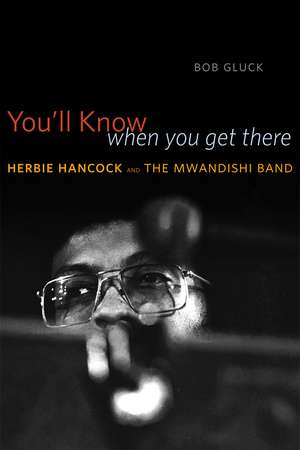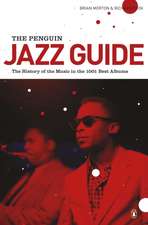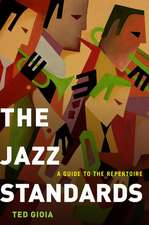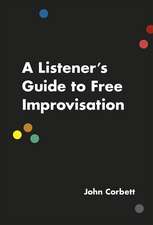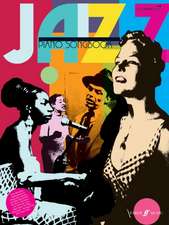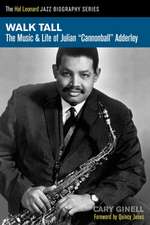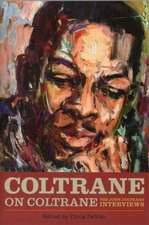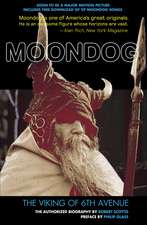You'll Know When You Get There: Herbie Hancock and the Mwandishi Band: Emersion: Emergent Village resources for communities of faith
Autor Bob Glucken Limba Engleză Hardback – 15 aug 2012
As the 1960s ended, Herbie Hancock embarked on a grand creative experiment. Having just been dismissed from the celebrated Miles Davis Quintet, he set out on the road, playing with his first touring group as a leader until he eventually formed what would become a revolutionary band. Taking the Swahili name Mwandishi, the group would go on to play some of the most innovative music of the 1970s, fusing an assortment of musical genres, American and African cultures, and acoustic and electronic sounds into groundbreaking experiments that helped shape the American popular music that followed. In You’ll Know When You Get There, Bob Gluck offers the first comprehensive study of this influential group, mapping the musical, technological, political, and cultural changes that they not only lived in but also effected.
Beginning with Hancock’s formative years as a sideman in bebop and hard bop ensembles, his work with Miles Davis, and the early recordings under his own name, Gluck uncovers the many ingredients that would come to form the Mwandishi sound. He offers an extensive series of interviews with Hancock and other band members, the producer and engineer who worked with them, and a catalog of well-known musicians who were profoundly influenced by the group. Paying close attention to the Mwandishi band’s repertoire, he analyzes a wide array of recordings—many little known—and examines the group’s instrumentation, their pioneering use of electronics, and their transformation of the studio into a compositional tool.
From protofunk rhythms to synthesizers to the reclamation of African identities, Gluck tells the story of a highly peculiar and thrillingly unpredictable band that became a hallmark of American genius.
Din seria Emersion: Emergent Village resources for communities of faith
-
 Preț: 144.99 lei
Preț: 144.99 lei -
 Preț: 94.22 lei
Preț: 94.22 lei -
 Preț: 133.01 lei
Preț: 133.01 lei -
 Preț: 146.50 lei
Preț: 146.50 lei -
 Preț: 125.33 lei
Preț: 125.33 lei -
 Preț: 179.93 lei
Preț: 179.93 lei -
 Preț: 307.53 lei
Preț: 307.53 lei -
 Preț: 138.81 lei
Preț: 138.81 lei -
 Preț: 208.31 lei
Preț: 208.31 lei - 18%
 Preț: 348.59 lei
Preț: 348.59 lei -
 Preț: 156.84 lei
Preț: 156.84 lei -
 Preț: 300.55 lei
Preț: 300.55 lei -
 Preț: 273.93 lei
Preț: 273.93 lei -
 Preț: 176.35 lei
Preț: 176.35 lei - 9%
 Preț: 352.77 lei
Preț: 352.77 lei -
 Preț: 544.68 lei
Preț: 544.68 lei -
 Preț: 310.21 lei
Preț: 310.21 lei - 8%
 Preț: 311.68 lei
Preț: 311.68 lei -
 Preț: 105.59 lei
Preț: 105.59 lei - 8%
 Preț: 360.28 lei
Preț: 360.28 lei -
 Preț: 126.95 lei
Preț: 126.95 lei -
 Preț: 176.35 lei
Preț: 176.35 lei - 6%
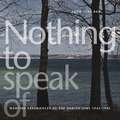 Preț: 324.95 lei
Preț: 324.95 lei -
 Preț: 101.43 lei
Preț: 101.43 lei -
 Preț: 143.71 lei
Preț: 143.71 lei -
 Preț: 185.37 lei
Preț: 185.37 lei -
 Preț: 163.52 lei
Preț: 163.52 lei - 12%
 Preț: 251.95 lei
Preț: 251.95 lei -
 Preț: 182.98 lei
Preț: 182.98 lei - 18%
 Preț: 2261.34 lei
Preț: 2261.34 lei -
 Preț: 166.59 lei
Preț: 166.59 lei -
 Preț: 159.42 lei
Preț: 159.42 lei -
 Preț: 115.82 lei
Preț: 115.82 lei -
 Preț: 277.54 lei
Preț: 277.54 lei -
 Preț: 161.12 lei
Preț: 161.12 lei -
 Preț: 114.66 lei
Preț: 114.66 lei - 12%
 Preț: 290.56 lei
Preț: 290.56 lei -
 Preț: 183.89 lei
Preț: 183.89 lei - 17%
 Preț: 423.14 lei
Preț: 423.14 lei - 9%
 Preț: 352.50 lei
Preț: 352.50 lei -
 Preț: 147.26 lei
Preț: 147.26 lei - 8%
 Preț: 563.24 lei
Preț: 563.24 lei -
 Preț: 229.92 lei
Preț: 229.92 lei - 8%
 Preț: 346.31 lei
Preț: 346.31 lei -
 Preț: 216.08 lei
Preț: 216.08 lei -
 Preț: 215.51 lei
Preț: 215.51 lei - 9%
 Preț: 353.24 lei
Preț: 353.24 lei -
 Preț: 140.57 lei
Preț: 140.57 lei -
 Preț: 92.35 lei
Preț: 92.35 lei - 8%
 Preț: 564.99 lei
Preț: 564.99 lei
Preț: 481.18 lei
Preț vechi: 613.55 lei
-22% Nou
Puncte Express: 722
Preț estimativ în valută:
92.15€ • 94.03$ • 77.53£
92.15€ • 94.03$ • 77.53£
Carte indisponibilă temporar
Doresc să fiu notificat când acest titlu va fi disponibil:
Se trimite...
Preluare comenzi: 021 569.72.76
Specificații
ISBN-13: 9780226300047
ISBN-10: 0226300048
Pagini: 288
Ilustrații: 10 halftones, 22 line drawings
Dimensiuni: 152 x 229 x 30 mm
Greutate: 0.51 kg
Editura: University of Chicago Press
Colecția University of Chicago Press
Seria Emersion: Emergent Village resources for communities of faith
ISBN-10: 0226300048
Pagini: 288
Ilustrații: 10 halftones, 22 line drawings
Dimensiuni: 152 x 229 x 30 mm
Greutate: 0.51 kg
Editura: University of Chicago Press
Colecția University of Chicago Press
Seria Emersion: Emergent Village resources for communities of faith
Notă biografică
Bob Gluck is professor of music, a jazz historian, and director of the Electronic Music Studio at the State University of New York, Albany.
Cuprins
Preface
Introduction
Introduction
Chapter 1. A Defining Moment: November 1970
Chapter 2. Becoming Herbie Hancock
Chapter 3. The First Sextet
Chapter 4. New Musical Directions
Chapter 5. Moving toward Mwandishi
Chapter 6. Mwandishi: The Recording
Chapter 7. Crossings
Chapter 8. Quadraphonic Sound System: Patrick Gleeson on Tour and Sextant
Chapter 9. Musical Collectivity and Open Forms
Chapter 10. Life on the Road, 1971–73, and the Critical Response
Chapter 11. Endings and Unexpected Recordings
Epilogue. Reminiscences and Legacy
Chapter 2. Becoming Herbie Hancock
Chapter 3. The First Sextet
Chapter 4. New Musical Directions
Chapter 5. Moving toward Mwandishi
Chapter 6. Mwandishi: The Recording
Chapter 7. Crossings
Chapter 8. Quadraphonic Sound System: Patrick Gleeson on Tour and Sextant
Chapter 9. Musical Collectivity and Open Forms
Chapter 10. Life on the Road, 1971–73, and the Critical Response
Chapter 11. Endings and Unexpected Recordings
Epilogue. Reminiscences and Legacy
Appendix
Notes
References
Discography
Index
Notes
References
Discography
Index
Recenzii
“In the forty years that have passed since I saw the Mwandishi band in Kansas City as a teenager, I have heard and even been able to participate in a lot of great music. But nothing I have experienced since has had more of an effect on my life than what those guys brought to the bandstand on those KC nights. To me, that band was the epitome of everything that jazz has ever promised to be. Collectively and individually, they brought together a sound that was so deeply in and of that moment in time that it became thus transcendent and timeless. They inspired me and a generation to aspire to their level of creativity and commitment. Herbie has always been one of my major heroes and still is. He has been great every step of the way from the beginning, but there was something really special with this band and the way it intersected with the culture that was unique and important. This book takes an in depth look at every detail of what made that amazing collection of musicians what it was. With his exhaustive research and detailed interviews, Bob Gluck brings the nature and workings of this amazing and influential ensemble to life.”
“In You’ll Know When You Get There, Bob Gluck takes a fascinating look at the development of a musical identity. The book is ostensibly about pianist Herbie Hancock and his sextet’s Mwandishi period—a free-jazz, electronics-heavy evolution of the hard-bop group he formed in 1968—but it really uses Hancock’s story to show how musicians adapt to changing technology, new musical ideas and greater cultural identities. At its core, the book is a study about how an artist accumulates a sound and the experiences that shape his musical views…..Perhaps, with this excellent primer, more listeners will start to unearth the joys found in Mwandishi’s three recordings.”
“Gluck gives a keen sense of Hancock’s wide-ranging curiosity and eager assimilation of influences, embracing diverse African and Asian musics, the Klangfarbenmelodie of the European avant-garde. . . . and contemporary directions in funk and pop. We get insights into Hancock’s successful attempts to forge a new musical language, as well as his involvement in post-production and his delight in gadgetry. . . . There is a vast amount of information in You'll Know When You Get There, including interviews with and brief biographies of the band members. While they stress the collective dynamic of the group— ‘we were a family’—their individual achievements read like a who’s who of hard- and post-bop jazz. There are also tributes and reminiscences from eminent successors such as Bobby McFerrin and Pat Metheny. We are given clear explanations of the converging styles and forms and the band’s open but disciplined approach to improvisation. . . . The influence of the Mwandishi Band persists to the present day, beyond jazz, and this book does a good job in explaining how and why.”
“Perhaps the most enigmatic ensemble to emerge from the Davis school was Herbie Hancock’s Mwandishi Band, which today has acquired an almost legendary status. If pressed, most fans of music from this era would cite this ensemble as their favourite of the period—indeed for some it is their favourite jazz ensemble of all time. So how did this band acquire its almost mythical status? It’s a question that no-one has quite been able to put their finger on until Bob Gluck’s exhaustive study, which offers valuable insight into the life and times of this band, with a wide range of interviews from the musicians themselves and those in the business—record company producers, execs, promoters and the like. . . . In detail and breadth this is an impressive volume and is valuable for the insight it offers into the music making process, the artistic milieu of the period, and aesthetic aspirations behind the project.”
“Gluck’s rich tapestry of musicians’ voices and concise, descriptive analyses allows for a reassessment of a period often over-looked in jazz scholarship.”
“An accomplished keyboardist and electronic synthesist himself, Gluck provides a wealth of insight into Hancock’s music.”
“Gluck has just enough actual experience and theoretical smarts to travel down the multidirectional vectors of the sonic experiments conducted by Herbie and his group and report back the totality of his findings. . . . Some of the most compelling sections of You’ll Know When You Get There are those which reveal how the group’s kinetic trajectory as an Afrodelic electroacoustic improvising unit was fully technologised and turbo-boosted in the crucible of the mix. . . . Gluck’s interviewees attest to how advanced all this was for the time. In terms of process, groups such as Can or those led by Miles Davis were monolithic jam bands whose records had to be assembled into alien artefacts in the editing suite. On stage, The [Herbie Hancock] Sextet was already a shapeshifting time machine, moving from zero gravity tonal abstraction to quantum funk via dynamic thematic material and on-the-fly programming and processing, and the records documented electric real-time performances being expanded via the alchemical science of the console room. It was, as trombonist Pepo Mtoto Julian Priester states, ‘a whole that was unified.’”
“The music, rather than the personalities or life stories of the musicians, is this book’s raison d’etre. Musicians will find transcriptions of value, while non-musicians will not be overwhelmed by the notations and technical descriptions. Gluck goes to great length to describe the music meaningfully to the broader audience, always striving to encapsulate the special qualities of this body of work. . . . As well-known as Hancock is, this book serves as a valuable resource to understanding his progress, and leaves one hoping for official releases of many of the unissued concert recordings discussed here.”
“Time has revealed Herbie Hancock's Mwandishi band to be one of the most exceptional and successful achievements of both a transformative musical era and Hancock's own long and varied career. A triumph of ‘fusion’ in the most comprehensive sense of the term, Mwandishi merged the acoustic and electric, the exploratory and fundamental, and the musical and social in a manner that has rarely been duplicated. Bob Gluck does an inspired job in helping us to hear, and understand, every step of Mwandishi’s process.”
“Bob Gluck deserves much credit for choosing to write a book on, quite possibly, the most futuristic band of the last half-century. The music of Herbie Hancock’s ‘Mwandishi’ period still stands, over 40 years later, as some of the most advanced and fearless music of all-time.”
“With You’ll Know When You Get There, jazz historian Bob Gluck breaks down Hancock’s days with the Mwandishi band as it blurred the lines between jazz, rock, classical and electronic music. It’s expertly researched and it features interviews with Hancock, close associates and all of the members of Mwandishi band. It’s a perfect primer to what turned out to be the most experimental and innovative phases of Hancock’s career.”
“Even though Herbie was the leader, with the Mwandishi band he let the music lead. Here was this mountain of a musician, one of my heros, with so much experience and knowledge, just letting the music go by itself. He was a servant of the music. That made a huge impression on me and on my life. It's about time somebody wrote a book about this important band.”
“You’ll Know When You Get There fills an important omission in jazz scholarship. In fact, the thin body of literature on a jazz figure as imposing as Herbie Hancock makes this book a matter of some urgency. Filled with meaty stuff, good quotes, and insightful conclusions, Bob Gluck’s book is a substantial and needed look at an important era of American music.”
“Mwandishi's combination of richly woven Afrocentric ideas with advancing music technology had a powerful effect on me. The fact that Mwandishi took on the concept of the Double Consciousness discussed by Du Bois and, at least for a time, took on sociopolitical ideas and was progressively pushing at the boundaries of jazz expression has a powerful relationship to the work that I've done with Living Colour, Masque, and the Yohimbe Brothers. They helped to lead the way forward.”
“As I began reading this book I was immediately and pleasantly transported to an exciting place. Bob Gluck writes of a time and of events that I was a part of and of course remember well, but the writer’s uncanny ability to touch on the intricacies of this music and its affect unveils for me a keener insight into the present. As the band evolved the music itself enslaved us. We were not the dictators of the outcome of the performances. The music told us what it needed and we were willing to unselfishly comply, to the point that the end result of the story was as much of a surprise to us as it was to the audience. It was exciting to go to work every night not knowing what to expect. What am I going to be compelled to do tonight? Can I face the challenge? Am I ready and capable? This is not something that can be contrived, not even if it is your prime objective. Our great fortune was the synergy, compatibility, sense of unity, and selflessness that we all shared with each other. Herbie was our leader in every sense of the word. In retrospect, I can see more clearly his great compassion in being a conduit, of sorts, for this magic (if you allow me to be so expressive) to take place. I’m very happy that Bob Gluck took on this great challenge to write this book. I would think it to be a daunting task to say the least.”
“Bob Gluck has devoted considerable time, effort, and talent to getting it right, the fascinating story of my old band. At 77, I've been around enough music and political activism that has become history to understand that this is not often enough the case. One usually reads about what purports to be one’s younger self and finds instead a stranger with the same name engaged in a world of the writer’s creation reflecting his/her interests in substitution of what really happened. You'll Know When You Get There is the marvelous exception and it made me cry with joy and longing for this long-lost world brought to life once more. Oh, guys, let's be 30 one more time and do this all over again....”
“Gluck’s You’ll Know When You Get There: Herbie Hancock and the Mwandishi Band is a welcome addition to the slowly growing bodies of scholarly literature on both post-1967 electric jazz and on iconic bands and recording projects. In addition, Gluck takes a step towards filling a mighty gap in jazz scholarship—biographical and analytic research on Herbie Hancock. For researchers, Hancock and his several closest collaborators have been difficult interview subjects, so this book, which blends hard-gotten author interviews with previous published material is extremely valuable to anyone interested in Hancock and his music in general, as well as the Mwandishi Band, which was a pioneer in electric/electronic jazz and musically adventurous.”
“Bob Gluck's book is a major accomplishment and welcomed addition to jazz literature, shedding light on the days when experimental and popular music flourished as one in America, portraying a great musician during one of his most innovative and creative periods, clarifying musical complexities in a way useful to both musicians and non-music-reading listeners, and even contributing to an understanding of that mysterious element—funk. Bob has gained insight from Herbie Hancock's fellow musicians, uses his own personal experience wisely (and modestly), and makes me want to hear the albums he discusses again. You'll Know When You Get There gets me there, not as a look back but with a view to what I'm hearing now.”
